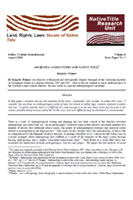Societies, communities and Native Title
In this paper, anthropologist Kinglsey Palmer examines the use and meaning of the terms ‘community’ and ‘society’ in Native Title cases. He considers this use from an anthropological point of view but situate it within legal contexts relevant to Native Title law. Palmer explores whether there is a difficulty for anthropologists in the way these terms may be used in the context of Native Title processes and if this be the case, how such difficulty may be alleviated or circumvented.
Palmer's proposition is that the dissonance between anthropologists and the application of their science in Native Title inquiries develops from differences between the characteristics of the former and the demands of the latter. At the heart of this difference is the nature of the process whereby anthropologists seek to describe and understand social process (relationships, meanings) on the one hand and another that seeks evidence (statements, expert views) to support or deny that a particular criterion or requirement has been met. The former sees social process as lacking absoluteness, the latter requires it. The former stresses change and mutability, the latter stasis and immutability.
This paper looks first at examples of how some legal thinking has defined or commented upon the terms ‘society’ or ‘community’. It then examines some of the anthropological thinking that develops from a consideration of these terms. Finally, it looks at how the two can be brought together, and examines the implications for doing so, potentially, for anthropologists.
